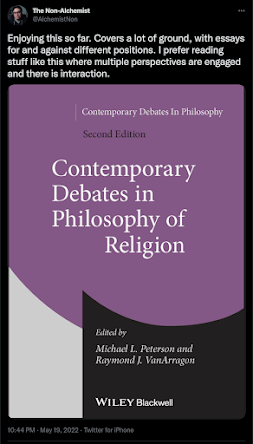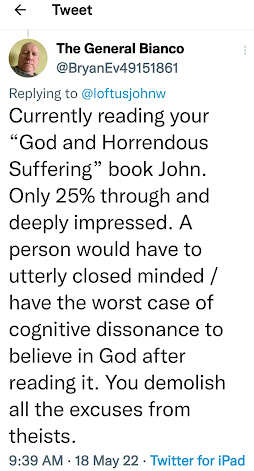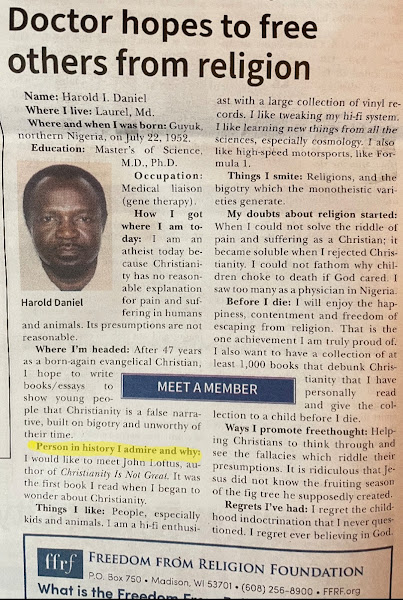Two Confusions of My Book "Unapologetic: Why Philosophy of Religion Must End"
“I know you believe you understand what you think I said, but I am not sure you realize that what you heard is not what I meant.” -- Richard Nixon
It's sad that too many people misunderstand my book "Unapologetic." Let me address two of the biggest confusions.
ONE) Some people might conclude I have nothing but distain for the discipline I majored in, the philosophy of religion, even though I have contributed several books based in that discipline.
I do nothing more than what the late biblical scholar Dr. Hector Avalos did in his book calling for The End of Biblical Studies. He called for the end of them AS THEY WERE BEING PRACTICED! The reason I say this is because Avalos and I both know that how our respective disciplines are being practiced won't change anytime soon. So we seek to undermine them, to expose them as the sham they really are, by doing our part to end them.
Avalos wrote:
From my perspective, there are really only 3 alternatives for what is now called biblical studies.Dr. Avalos argued it's unreasonable to think biblical scholars could achieve alternative #1. Like the automobile it's here to stay, so long as there are Christians. Likewise, when it comes to the philosophy of religion. So long as there are Christian philosophers in defense Christian theism, they aren't going away either. Option #2 is already being done in seminaries. They actually consider biblical studies to be an extension of Anselm's dictum, "faith seeking understanding." When it comes to the philosophy of religion, merely acknowledging that it's a religionist faith-based enterprise made subservient to apologists is not good enough. For then we'd be found to enable foolish, delusional thinking, with the dubious goal of having a discussion for discussion's sake when we need to change minds.
1. Eliminate biblical studies completely from the modern world.
2. Retain biblical studies as is, but admit that it is a religionist enterprise.
3. Retain biblical studies, but redefine its purpose so that it is tasked with eliminating completely the influence of the Bible in the modern world.
Dr. Avalos preferred the option #3.
I prefer the third option. The sole purpose of biblical studies would be to help people move toward a postscriptural society...What I seek is liberation from the very idea that any sacred text should be an authority for modem human existence. Abolishing human reliance on sacred texts is imperative when those sacred texts imperil the existence of human civilization as it is currently configured. The letter can kill. That is why the only mission of biblical studies should be to end biblical studies as we know it. LINK to Excerpt.When it comes to debunking Christianity I seek to use all the tools available, all of them, including the philosophy of religion. Just take a look at two books I had published AFTER I wrote the book Unapologetic: The Case against Miracles along with God and Horrendous Suffering. They have sections in them that fall squarely in the philosophy of religion area. My goal in them, my focus, is to change minds. I seek to help reason people out of their faith, even though I know it's extremely hard to reason people out of that which they were never reasoned into, who have a tribal motivation to stay within the confines of their cultural indoctrination. I also know such a goal gets tougher and tougher the more educated people become in their delusion.
My focus is on the irrationality of faith itself, and the lack of any relevant objective evidence for any of the miracles in the Bible. My focus is on five powerful reasons not to believe.
The best online excerpt explaining the goal of my book is probably the one Hemant Mehta posted just after its release, right here.
I argue toward what anthropology professor Dr. David Eller advocates in his next book to be published, Liberatheism. It's the third book in a trilogy that includes Natural Atheism (2004) and Atheism Advanced (2007) [See my review of this book!] Eller explains this third book in his Preface:
Natural Atheism was an explanation, examination, and defense of atheism on the premise that humans are born without any religious ideas or beliefs and hence “natural” atheists. Atheism Advanced Further Thoughts of a Freethinker, as the name suggests, pushed atheism in new directions, especially beyond argument about the Christian god, for instance, emphasizing that there are many other theisms and many other gods than Christianity and its god, and noting how arguing about god(s) in a Christian context still has us “speaking Christian.” This current book pushes further still, envisioning a future when we no longer fight about god(s) because we are free of god(s)....TWO) Some people might conclude I advocate ridicule to the exclusion of reasoned arguments, and that this would be counter-productive toward my goals of reaching believing Christians. I have documented the effectiveness of ridicule in several blog posts. But the evidence of my writing on this blog and in my books should dispel this confusion easily, since in them I exclusively reason with believers. I advocate telling our debate opponents the truth even though it may offend them, but only if it's based on good sound arguments, something philosopher Dr. Stephen Law has argued in an essay I agree with completely. He offers five morals that should guide debates between atheists and believers. I don't advocate ridiculing people to their faces, and I almost never do so. But as a general rule ridicule is good and effective. Comedians do it all the time. It can even be considered venting, and in that case why should we not do it in public? If people don't want to come to the show they don't have to do so.
The first step in this process, in theism-dominated societies, is atheism—saying no to god(s). The eighth chapter describes the profound damage that religion has done to philosophy, the oldest form of rational inquiry. It condemns the academic field of philosophy of religion as little more than an adjunct to Christian theology and apologetics. An ultimate betrayal of the commission to analyze and critique our pet ideas and concepts, as well as a colossal waste of brainpower and resources, philosophy of religion is encouraged to liberate itself from its role as a defender of Christianity to become a genuine philosophical approach to the question of religion. The tenth chapter provides some practical advice on how to change people’s minds from theism to atheism, taking advantage of the best knowledge and practices in psychology, education, marketing, and behavioral economics. The chapter invites us to think in terms of “attitude change” and away from conventional confrontational tactics like argument and debate.
The next step is liberatheism—getting free of god(s). The final step is not talking about god(s) at all. The goal is to accelerate toward the day when we no longer argue about god(s) but live free from god(s), when god(s) are simply not worth talking about anymore.
--------------
John W. Loftus is a philosopher and counter-apologist credited with 12 critically acclaimed books, including The Case against Miracles, God and Horrendous Suffering, and Varieties of Jesus Mythicism. Please support DC by sharing our posts, or by subscribing, donating, or buying our books at Amazon. Thank you so much!





















